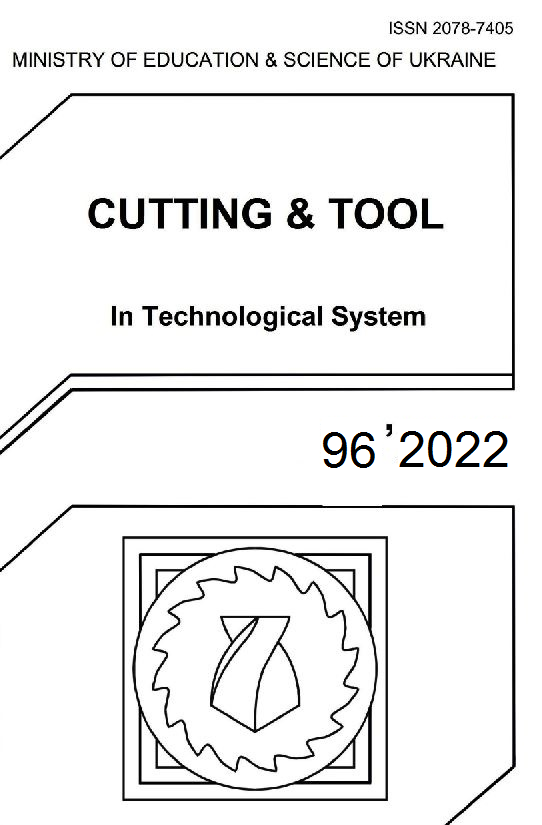EVALUATION OF PERFORMANCE EFFICIENCY OF PACKING A GROUP OF PRODUCTS IN THE WORKPLACE OF ADDITIVE MACHINE USING A GENETIC ALGORITHM
DOI:
https://doi.org/10.20998/2078-7405.2022.96.02Keywords:
technology planning, additive manufacturing, triangulated model, voxel model, packingAbstract
Research results of possibilities of packing a group of 3D-models of products in a layered build space using a genetic algorithm are presented. It is proposed to determine the efficiency of the optimization problem of rational arrangement of 3D-models group in the workspace of additive machines depending on the number of loaded products. Condition for efficient use of the layered build workspace is the minimum number of layers per product and the largest relative filling. Such criteria are important, for example, for SLS/SLM technologies. Examples of evaluation based on the analysis of derived voxel 3D model of the workspace with located products are considered. Industrial products with different geometrical complexity were selected as test 3D models. This approach allowed to perform a comparative analysis of the results depending on the design features of products. The practical realization was performed in the subsystem of packing 3D-models in a workspace, which is part of the technological preparation system for the manufacture of complex products by additive methods. This system was developed at the Department of "Integrated Technologies of Mechanical Engineering" named after M. Semko of NTU "KhPI".
References
Che Y., Hu K., Zhang Z., Lim A. Machine scheduling with orientation selection and two-dimensional packing for additive manufacturing. Computers & Operations Research, 2021. 130, 105245. doi: 10.1016/j.cor.2021.105245.
Chekanin V.A., Chekanin A.V. Solving the Problem of Dense Packing of Objects of Complex Geometry. In: Evgrafov A.N. (eds) Advances in Mechanical Engineering. Lecture Notes in Mechanical Engineering. Springer, Cham, 2022. doi: 0.1007/978-3-030-91553-7_12.
Garashchenko Y., Rucki M. Part decomposition efficiency expectation evaluation in additive manufacturing process planning. International Journal of Production Research, 2021. 14 р. doi: 10.1080/00207543.2020.1824084.
Psiola V.V.: Approximate solution of a 3-dimensional packaging problem based on heuristics. Intelligent systems, 2011. Vol. 1, 83-100 [in Russian].
Stoyan Y., Gi l N., Scheithauer G. Packing of convex polytopes into a parallelepiped. Preprint. Dresden. MATH-NM-06-2004, 2004. 32 pages.
Oh Y., Witherell P., Lu Y., Sprock T. Nesting and Scheduling Problems for Additive Manufacturing: A Taxonomy and Review. Additive Manufacturing, 2020. 101492.
Aguilar-Duque J.I., Balderrama-Armendáriz C.O., Puente-Montejano C.A. et al. Genetic algorithm for the reduction printing time and dimensional precision improvement on 3D components printed by Fused Filament Fabrication. Int J Adv Manuf Technol 115, 2021. 3965–3981. doi: 10.1007/s00170-021-07314-w.
Li Y.B., Sang H.B., Xiong X., Li Y.R. An Improved Adaptive Genetic Algorithm for Two-Dimensional Rectangular Packing Problem. Applied Sciences, 11(1), 2021. 413.
Zhao Y., Rausch C., Haas C. Optimizing 3D irregular object packing from 3D scans using metaheuristics. Advanced Engineering Informatics, 47, 2021. 101234.
Araújo L.J.P., Panesar A., Özcan E., Atkin J., Baumers M., Ashcroft I. An experimental analysis of deepest bottom-left-fill packing methods for additive manufacturing, Int. J. Prod. Res. 0 (0), 2019. 1–17. doi: 10.1080/00207543.2019.1686187 Nov. 11. Vanek J., et al. PackMerger: a 3D Print volume optimizer, Comput. Graph. Forum 33 (6), 2014. 322–332, doi: 10.1111/cgf.12353 Sep.
Luzon Y., Khmelnitsky E. Job sizing and sequencing in additive manufacturing to control process deterioration, IISE Trans. 51 (2), 2019. 181–191. doi: 10.1080/24725854.2018.1460518 Feb.
Fera M., Macchiaroli R., Fruggiero F., Lambiase A.
A modified tabu search algorithm for the single-machine scheduling problem using additive manufacturing technology,”, Int. J. Ind. Eng. Comput. 11 (3), 2020. 401–414.
Li Q., Zhang D., Wang S., Kucukkoc I. A dynamic order acceptance and scheduling approach for additive manufacturing on-demand production, Int. J. Adv. Manuf. Technol., 2019. doi: 10.1007/s00170-019-03796-x May.
Yang W., Liu W., Liu L., Xu A. A genetic algorithm for automatic packing in Rapid prototyping processes, Advanced Intelligent Computing Theories and Applications. With Aspects of Theoretical and Methodological Issues, 2008. pp. 1072–1077. doi: 10.1007/978-3-540-87442-3_132.
Garashchenko Y., Vitiaziev J., Grimzin I. Packing 3D-Models of Products in Build Space of Additive Manufacturing Machine by Genetic Algorithm. Advanced Manufacturing Processes III. InterPartner 2021. Lecture Notes in Mechanical Engineering. Springer, Cham, 2022. P. 67-77. doi: 10.1007/978-3-030-91327-4_7.
Kureichik V., Kureichik V., Gladkov L. Genetic algorithms. Moscow: Fizmat-lit, 2010. 368 p. [in Russian].
Garashchenko Y., Zubkova N. Adaptive slicing in the additive manufacturing process using the statistical layered analysis. Advances in Design, Simulation and Manufacturing III. DSMIE 2020. Lecture Notes in Mechanical Engineering. Springer, Cham, 2020. P. 253-263. doi: 10.1007/978-3-030-50794-7_25.
Vitjazev Ju.B. Rasshirenie tehnologicheskih vozmozhnostej uskorennogo formoobrazovanija sposobom stereolitografii: Dis... kand. tehn. nauk: 05.02.08, Har'kov, 2004. 228 s.
Downloads
Published
Issue
Section
License
Copyright Notice
Authors who publish with this Collection agree to the following terms:
1. Authors retain copyright and grant the Collection right of first publication with the work simultaneously licensed under a Creative Commons Attribution License that allows others to share the work with an acknowledgement of the work's authorship and initial publication in this Collection.
2. Authors are able to enter into separate, additional contractual arrangements for the non-exclusive distribution of the Collection's published version of the work (e.g., post it to an institutional repository or publish it in a book), with an acknowledgement of its initial publication in this Collection.
3. Authors are permitted and encouraged to post their work online (e.g., in institutional repositories or on their website) prior to and during the submission process, as it can lead to productive exchanges, as well as earlier and greater citation of published work.

